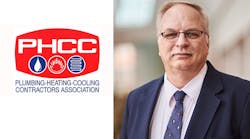DENVER, CO —As the PHC industry prepares for PHCCCONNECT2019, the Plumbing-Heating-Cooling-Contractors Association’s annual “trade show” held in Indianapolis Oct. 2-4, PHCC president-elect Jonathan Moyer gets ready to take over as head honcho to make his mark. Moyer, president of Cocalico Plumbing & Heating, Denver, a residential plumbing and HVAC service, replacement and new construction company, has been making customers happy for more than 29 years. Recently, CONTRACTOR caught up to Moyer to talk about his upcoming tenure as president, and about the industry.
CON: I’m always interested in how people were first introduced to the trades. How did you get started in the industry?
MOYER: I always liked building things and trying to figure out how they worked. After working in another construction trade, I had a relative in need of help in his plumbing and HVAC company, and I thought that looked like a great opportunity. Thirty-five years later I know I made the right choice.
CON: What are some skills that you have attained throughout your career that will help you in this PHCC position?
MOYER: Having been in this industry 35 years has given me great knowledge on the technical side of this industry. But more importantly, all the years as a business owner have given me the ability to work effectively with customers and employees. I have learned many people skills, such as team building, sales, coaching and encouraging employees. I also have learned how to work with others to complete projects. All are important to make PHCC a success.
CON: What will be your initiatives throughout your tenure as PHCC president?
MOYER: Protect the professional image of the plumbing and HVAC trades. Many states are trying to do away with licensing requirements, which would be detrimental to our industry by allowing many untrained people in this industry. Also, I’ll work toward achieving the goals of current PHCC strategic plan, which have been a steady focus of the PHCC leadership over the past five years. Then at the January 2020 PHCC Board of Directors’ meeting, we’ll set aside time to identify goals for our next five-year plan. I look forward to being part of that process.
CON: What do you think are the most pressing issues facing the industry? How can they be addressed through PHCC partnerships?
MOYER: The number of attacks on licensing come to mind first. For example, PHCC was very concerned about the recent licensing battle in Texas. We worked hard behind the scenes with our strong chapter in Texas to fight for continued regulatory oversight and were very relieved when Governor Abbott announced a two-year extension of the state licensing board. We were honored to participate in the June 14 Plumber’s Rally, where plumbing professionals stood in solidarity to first and foremost protect the public’s health and safety of Texas citizens and its environment. We anticipate more situations like this may arise in other states and stand ready to battle any future moves to remove the regulatory oversight of the plumbing profession.
Of course, the lack of qualified workers still is a major challenge for our members. In addition to providing tangible resources our members can use in their businesses, PHCC continues to advocate on Capitol Hill about the need for legislation that supports workforce development, including career and technical education. We’ve had some successes, such as the 2018 passage of the $1.2 billion Carl D. Perkins Career & Technical Education Act with additional funding over the next five years. Current priorities include providing regular input to the Department of Labor’s Task Force on Apprenticeship Expansion, stressing that current apprenticeship standards must remain in place, and engagement with policy makers at the Department of Labor and Congress to push for greater flexibility in apprentice-to-journeymen ratios. We also strive to increase our influence on key workforce issues by collaborating with other industry organizations on several coalitions. There’s definitely strength in numbers.
CON: What are some ideas to address the workforce development/skilled labor shortage in the PHC industry?
MOYER: It takes a lot of grassroots efforts to promote this industry as a good career choice. PHCC provides resources for that getting involved in schools and talking to students about opportunities in this industry, many of which can be pursued without incurring large college debt. Veterans and women are two other groups that have great potential for this industry.
CON: Training, education and communication, I think, are vital to the success of any contractor. Can you touch upon this as this relates to your business, and how it relates to what PHCC offers?
MOYER: We as a company have at least one company-wide training session per month. We also use PHCC and manufacturer/vendor training resources through the year. We have an open book policy at our company. We communicate with our employees about the company’s financial results and customer reviews, for example.
PHCC has a vast array of educational and training resources such as webinars, online apprentice, textbooks, business training and business coaches. Seminars also are presented throughout the country.
CON: Finally, the last time you said, “Today is a great day!” you were doing what?
MOYER: Spending time with my children and grandchildren at our vacation home in the mountains.


